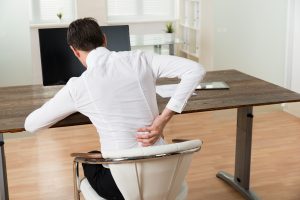 Dormant butt syndrome (DBS) – weak gluteal muscles – raises chronic knee, hip, and back pain risk. Knee, hip, and back pain is a growing problem in Americans, and researchers suggest many of these incidences have to do with what is known as dormant butt syndrome.
Dormant butt syndrome (DBS) – weak gluteal muscles – raises chronic knee, hip, and back pain risk. Knee, hip, and back pain is a growing problem in Americans, and researchers suggest many of these incidences have to do with what is known as dormant butt syndrome.
Dormant butt syndrome refers to tightness in the hip flexors and weakness of the gluteal muscles. When gluteal muscles are weak, surrounding muscles and joints absorb the strain during exercise, which can cause pain in such areas like the knees, hips, and back. This could potentially lead to surgery.
Advertisement
Physical therapist Chris Kolba said, “The entire body works as a linked system, and a lot of times when people come in with knee or hip injuries, it’s actually because their butt isn’t strong enough.” The rear end should act as support for the entire body and as a shock absorber for stress during exercise. But if it’s too weak, other parts of the body take up the slack and often results in injury.” Kolba is the one who coined the term dormant butt syndrome.
Although dormant butt syndrome is seen in individuals who exercise improperly, it also occurs in those who sit for prolonged periods of time. “It’s actually caused quite often by inactivity and the way we sleep. Sitting for periods throughout the day weakens the gluteal muscles and puts strain on other parts of our core, as does sleeping in the fetal position.”
Kolba suggests stretching and making a point to stand or walk around can help strengthen gluteal muscles thus preventing a possible injury.
Knee and back pain prevention tips
Knee and back pain are quite common, especially among older adults. Hurting knees and back can make performing daily tasks quite difficult. Here are some tips that can help you prevent knee and back pain.
Knee pain prevention tips:
- Stretch and warm up prior to exercise, cool down after exercise.
- Don’t overdo it, if it causes you pain modify the exercise or stop.
- Wear properly fitting shoes.
- Avoid running on hard surfaces.
- Avoid twisting your knees.
- Wear protective sports equipment.
- Stop exercise or activity if injury occurs – seek treatment.
Back pain prevention tips:
- Exercise regularly, but pick exercises that don’t further strain your back but rather strengthen it.
- Build muscle and flexibility – with core exercises, for example
- Maintain a healthy weight.
- Stand properly in neutral pelvic position, avoid standing for prolonged periods of time, alternate feet.
- Sit properly – have a chair with good lower back support, knees should be bent at 90 degrees, change positions every half-hour.
- Lift properly – avoid heavy lifting when possible, lift with your legs not your back, keep your back straight without twisting, and keep the load close to your body.
By following these tips, you can better help your knees and back, and prevent injury and pain.
Related Reading:
Simple trick to ease joint pain
Knee osteoarthritis, the leading cause of pain and disability for seniors, is a condition in which the cartilage between the bones – the cushion – slowly wears away, allowing the bones to rub together. There is currently no cure for knee osteoarthritis, but there are medications and therapeutic techniques that can help you gain your mobility and life back. Continue reading…
Advertisement
Aches and pains are somewhat of a normal occurrence the older we become, whether it is due to joint overuse or arthritis. With the onset of pain, many of us simply take some anti-inflammatory medications a few times a day, which allows us to carry on. Unfortunately though, there is growing evidence that long-term use of such medication can be quite harmful to the body. So instead of popping pills every four to six hours, try this natural, alternative remedy in order to experience relief from aching joints. Continue reading…
Sources:
https://wexnermedical.osu.edu/mediaroom/pressreleaselisting/dormant-butt-syndrome-mmr
http://www.arthritis.org/about-arthritis/where-it-hurts/knee-pain/knee-care/prevent-knee-problems.php
http://www.mayoclinic.org/diseases-conditions/back-pain/basics/prevention/con-20020797
